How are stories about the ocean best told?
In July 2022 the OceanStates project had the privilege of bringing 28 students from the University of the South Pacific on board the tall ship Statsraad Lehmkuhl of Bergen, for a three-week voyage in Fiji waters. In this blogpost, you can read about how students from across the world engaged in exercises of knowledge sharing through the oceanic practice of ‘talanoa’ on this voyage together.
Written by Benjamin Wheeler and Håkon Larsen
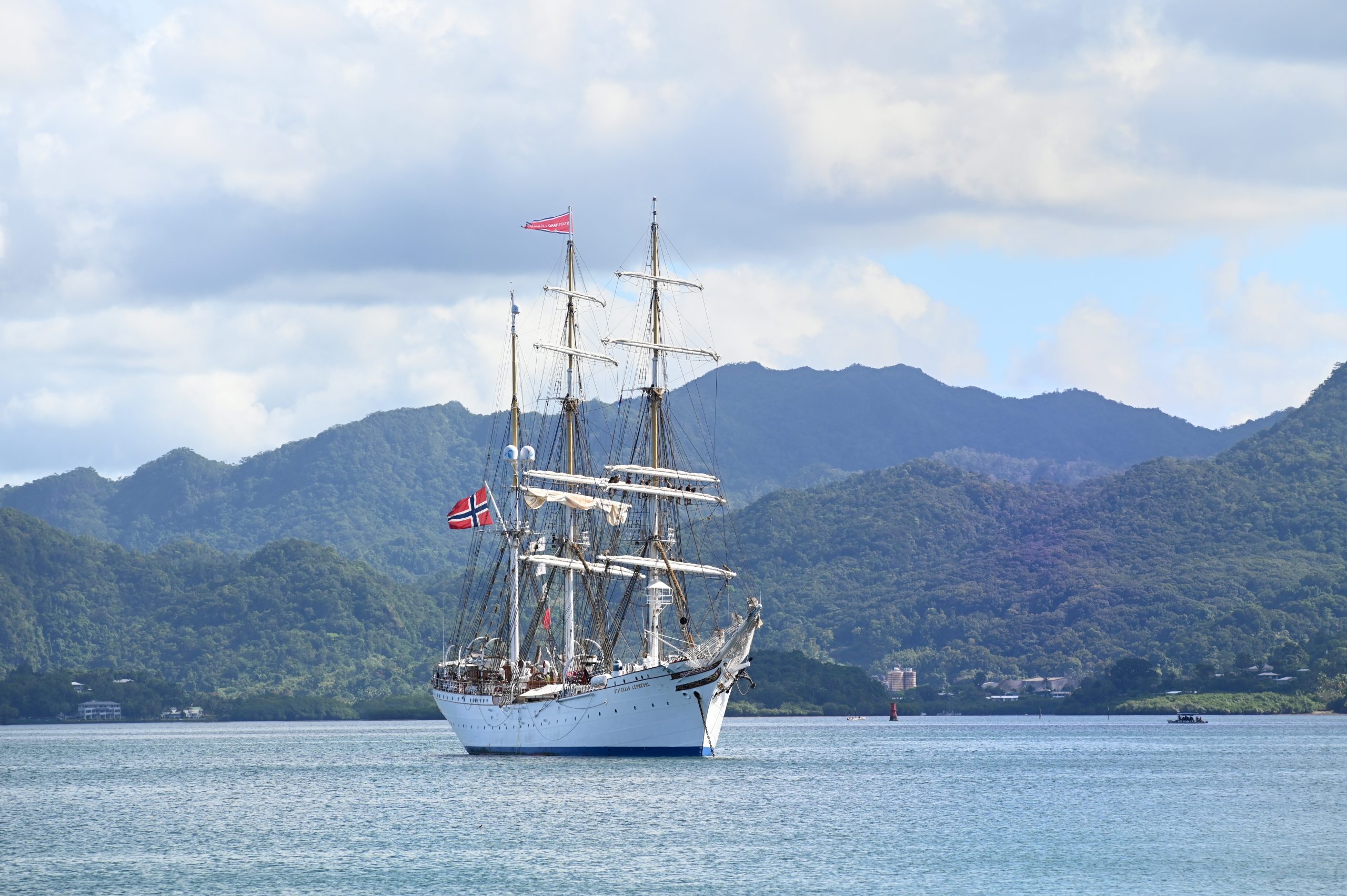
The Statsraad Lehmkuhl at anchor in Suva harbour, Fiji, 25 June 2022. Photo: Edvard Hviding
The Statsraad Lehmkuhl is a three-masted barque rigged sail training vessel, over one hundred years old, 98 metres long, and with a mainmast top 48 metres above sea level. She is the pride of Bergen, Norway.
For three weeks in July – as part of the One Ocean Expedition, a global circumnavigation over 20 months – the ship was home to 90 students from Europe and the Pacific Islands. Together they navigated the waters east of Fiji, training and educating bodies and minds in sailing skills and sustainability, with an intercultural, interdisciplinary focus on ocean and climate science, politics and diplomacy.

“It has been mind-blowing in many ways,” says Andrea Gjestvang, a marine biology graduate.
“You’re one part sailor, one part student. We’re bracing around the mast; that means we’re changing direction. How is the wind today?”
“At the same time, you are studying oceanography and learning about the trade winds you just used to sail from Valparaiso to Tahiti.”
Andrea is part of the group of European students who flew to Chile and boarded the Statsraad Lehmkuhl and crossed the Pacific with the University of Bergen, learning on the fly what it takes to crew a ship of this size. After Tahiti they set sail for Fiji, where a third of the students would disembark to undertake a land-based programme at the University of the South Pacific.
It was here that the students of the University of the South Pacific, mainly from Fiji, but also with representatives from other island states, embarked on their Pacific adventure, picking up the slack both nautically and academically.
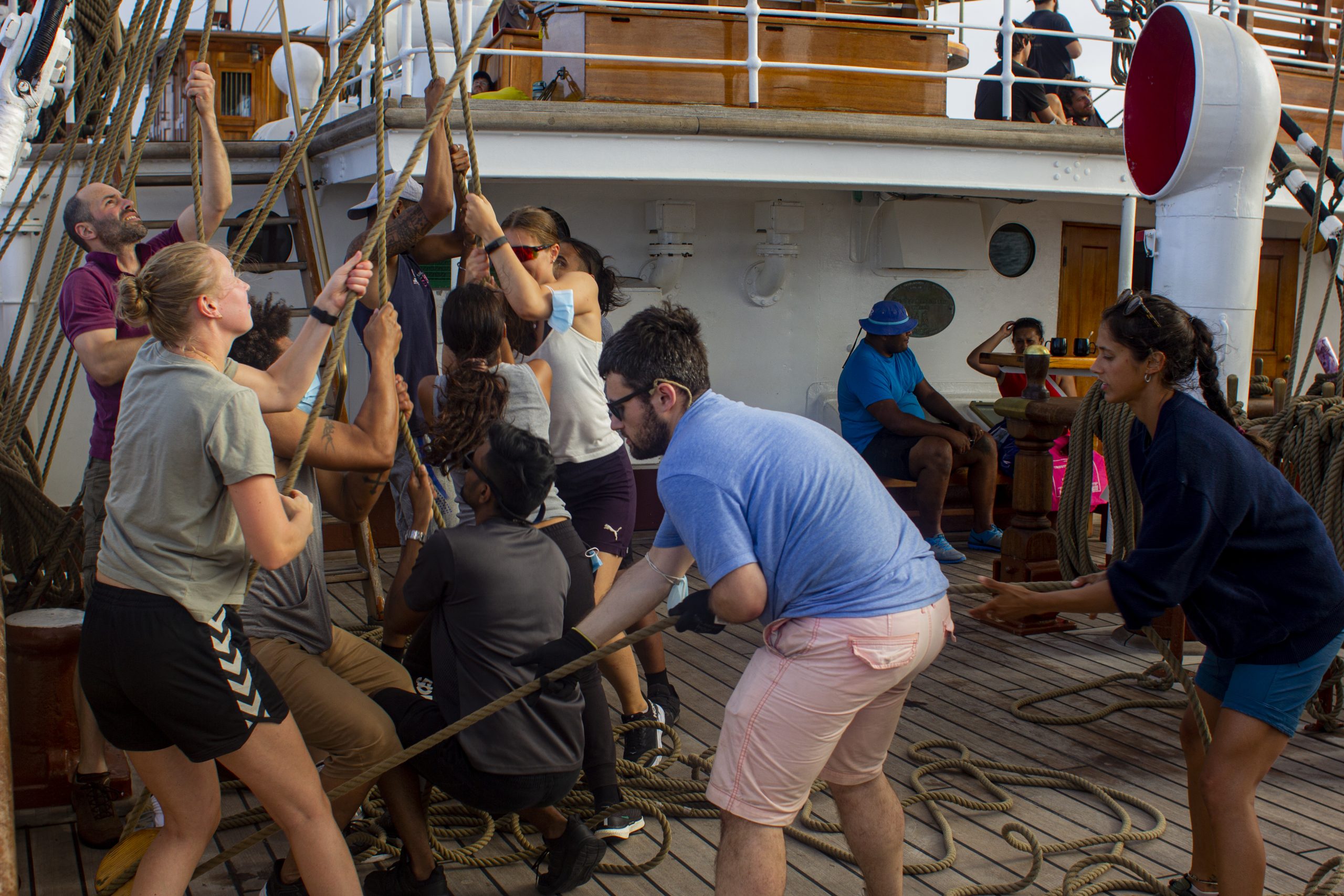
Teachers and students from different disciplines around the world working together under the supervision of the Statsraad Lehmkuhl’s experienced crew. Photo: Ben Wheeler

For those weeks, the teaching diversified significantly as the USP students became active participants in ocean storytelling practices.
“The opportunity to engage in talanoa with perspectives across a myriad of fields from within the region and beyond,” reflects politics and law student Ozayr Akbar, “the ability to relate our stories to one another, allowed Pasifika students to build on our own lived experiences, and our various narratives, and provide a more holistic understanding of our roles in ocean conservation and the climate crisis.”
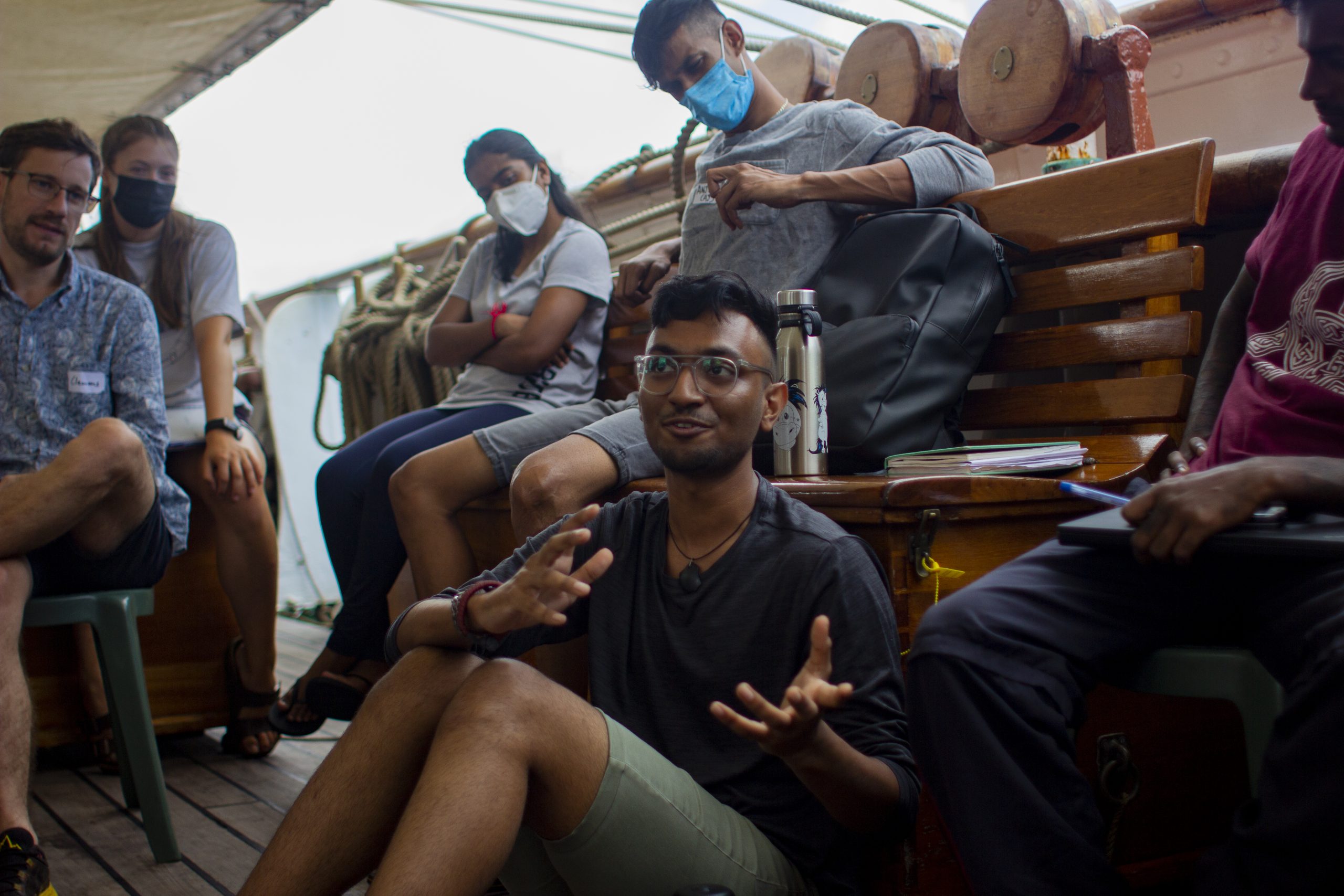
Ozayr Akbar in full flow. Photo: Ben Wheeler
Talanoa is a Fijian practice which is commonly referred to as a Pacific-oriented way of engaging and sharing insights in social spaces of discussion. Emphasis is placed on the importance of reciprocal interactions and inclusivity. It is a conversation which strives to establish dialogue between people, by transmitting a plurality of knowledge and experience on shared topics of concern, often through ways of storytelling.
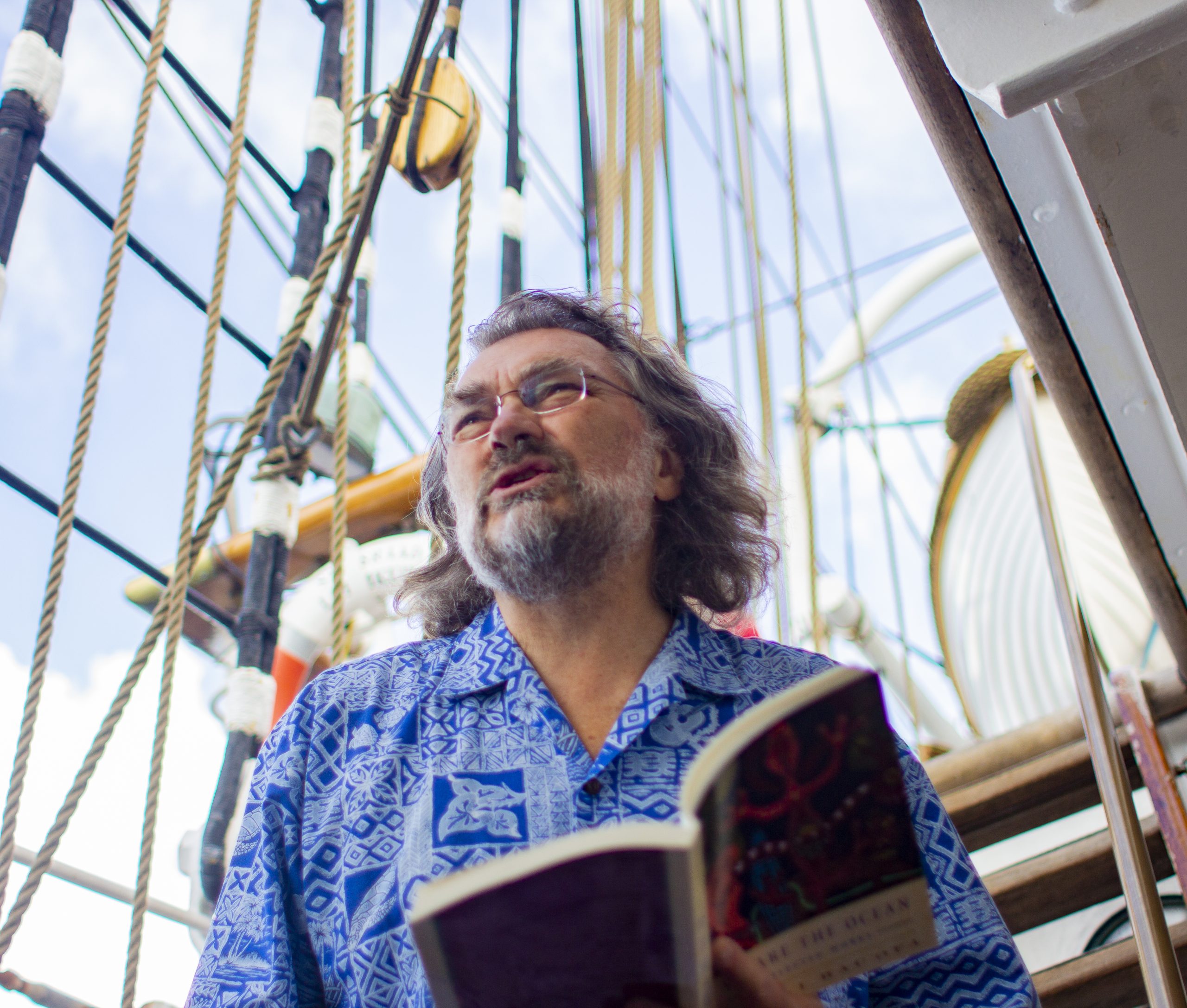
Professor Edvard Hviding leads a talanoa session with a quote from Epeli Hau’fa. Photo: Ben Wheeler
As readers familiar with Fiji and the Pacific are well-aware, the long-standing social practice of talanoa is a different way to intellectually engage with contemporary issues than what has been the common practice historically within Western institutions of education, politics, diplomacy and so forth. With its emphasis on promoting open engagements and creative expressions of knowledge, that are not premediated by fixed outcomes, students were encouraged to ground their discussions in and from local perspectives and experiences through the three-week talanoa, through different ways of ocean storytelling.
In this process, the sailing ship was not only functioning as a multidisciplinary classroom at sea, but moreover a truly cross-cultural experiment of engaging collectively with the major ocean challenges we currently face. In the spirit of talanoa, students discussed contemporary topics like climate change and sea level rise, deep-sea mining, development, territoriality, and diplomacy, by reflecting how such topics relate to people’s own identity, history, responsibilities, and visions for the future.

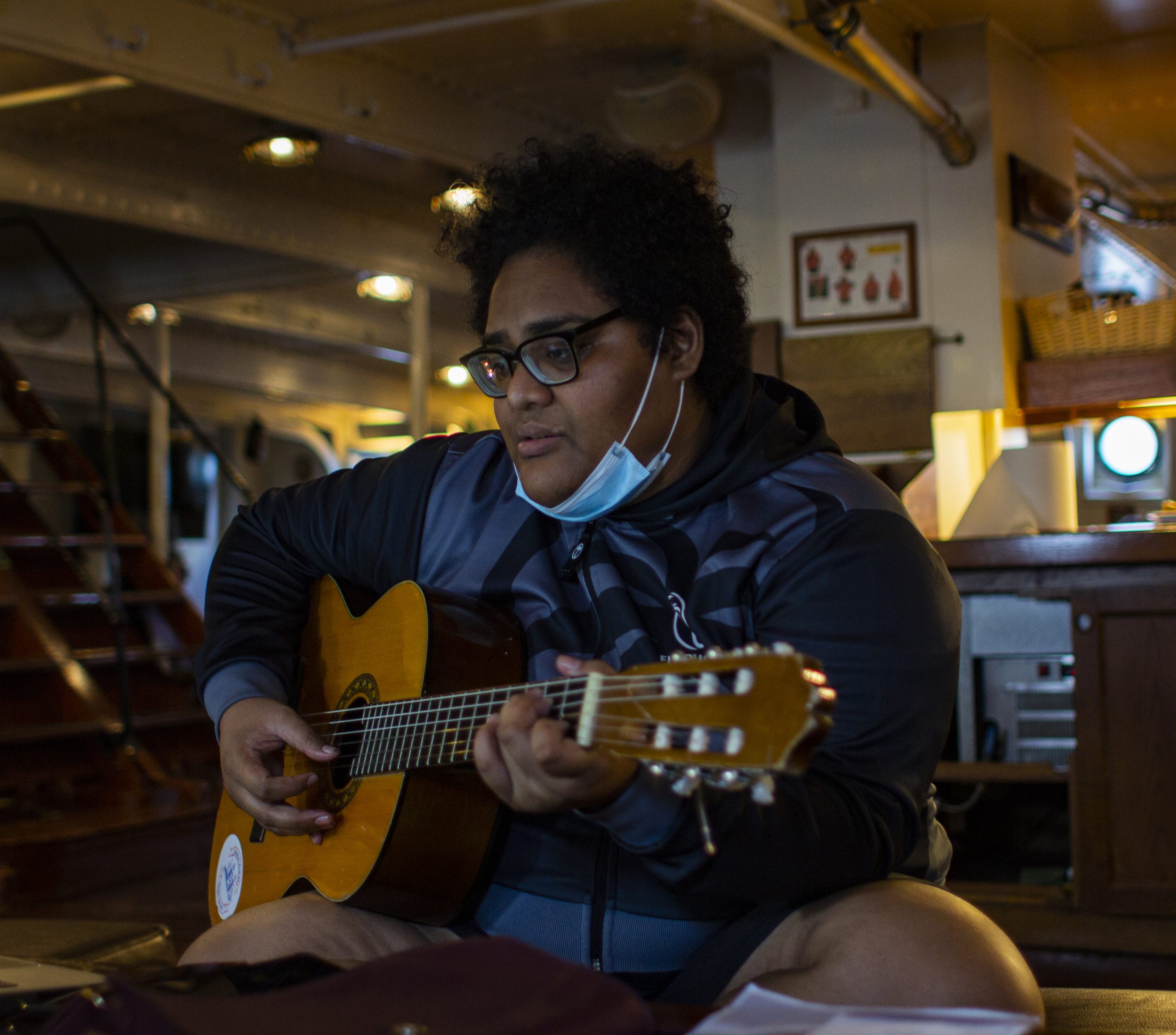
Anjulica Sinclair, whose rendition of Teresia Teaiwa’s mine land: an anthem provoked a strong emotional response in talanoa sessions. Photo: Ben Wheeler
Throughout the expedition, personal experiences and concerns were raised and listened to, as people reflected on different stories from their own cultural and disciplinary backgrounds. At times artistic performances of the poetry of Teresia Teaiwa and Henrik Ibsen were used to critically engage students and stimulate discussion of different histories of imperialism, struggles of power, and the security of livelihoods from a diverse set of oceanic perspectives.
One night, the main sail was used as a screen for the projection of Fiji born, New Zealand based filmmaker Lala Roll’s newest offering The Navigators, itself the story of a young indigenous girl’s ocean voyages that explore and contrast Maori star compass seafaring with the longitude and latitude strategies of their European counterparts during the eighteenth century.
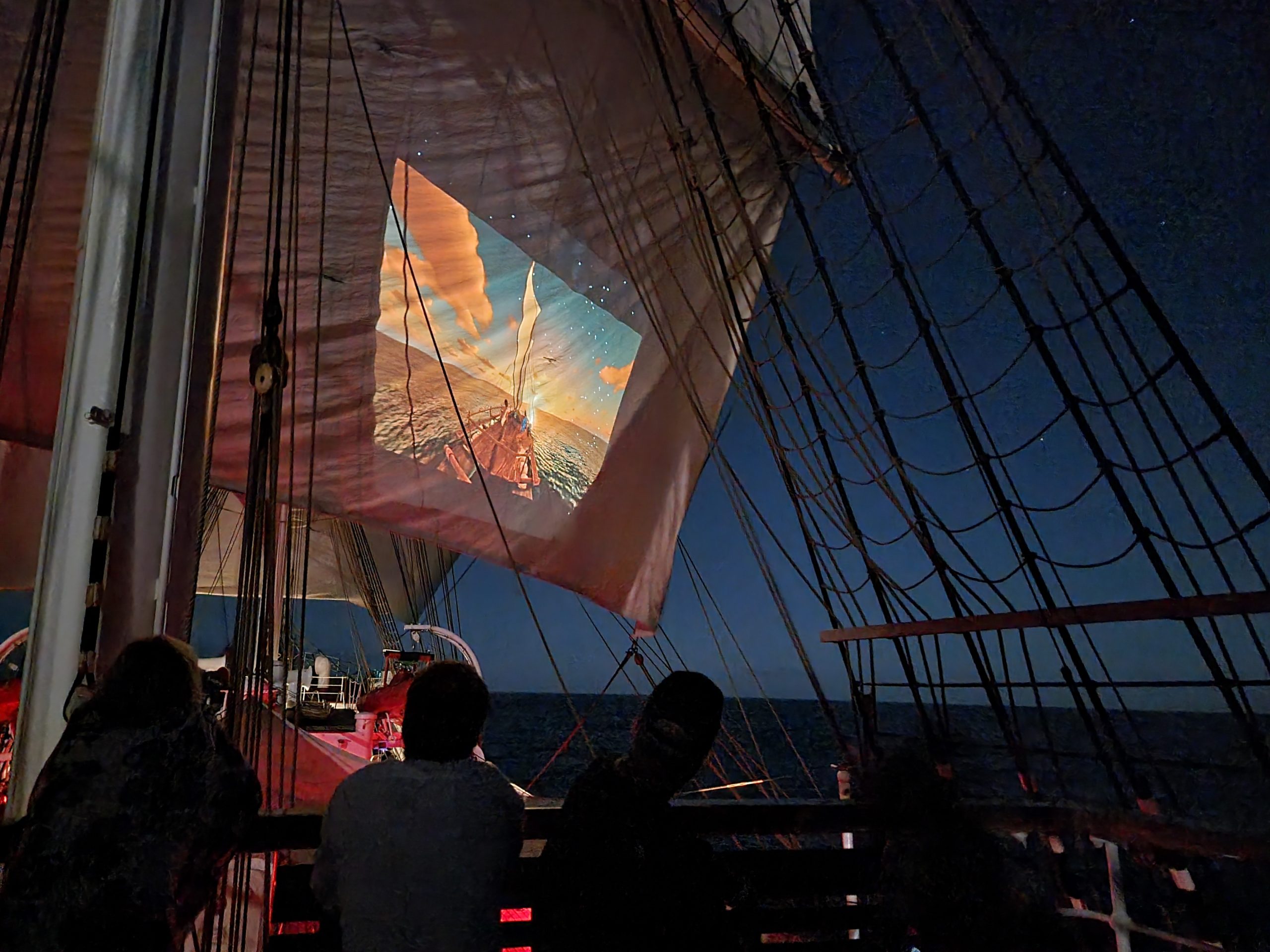
Ngā Tohunga Whakatere – The Navigators screening in the middle of the Pacific. Photo: Håkon Larsen

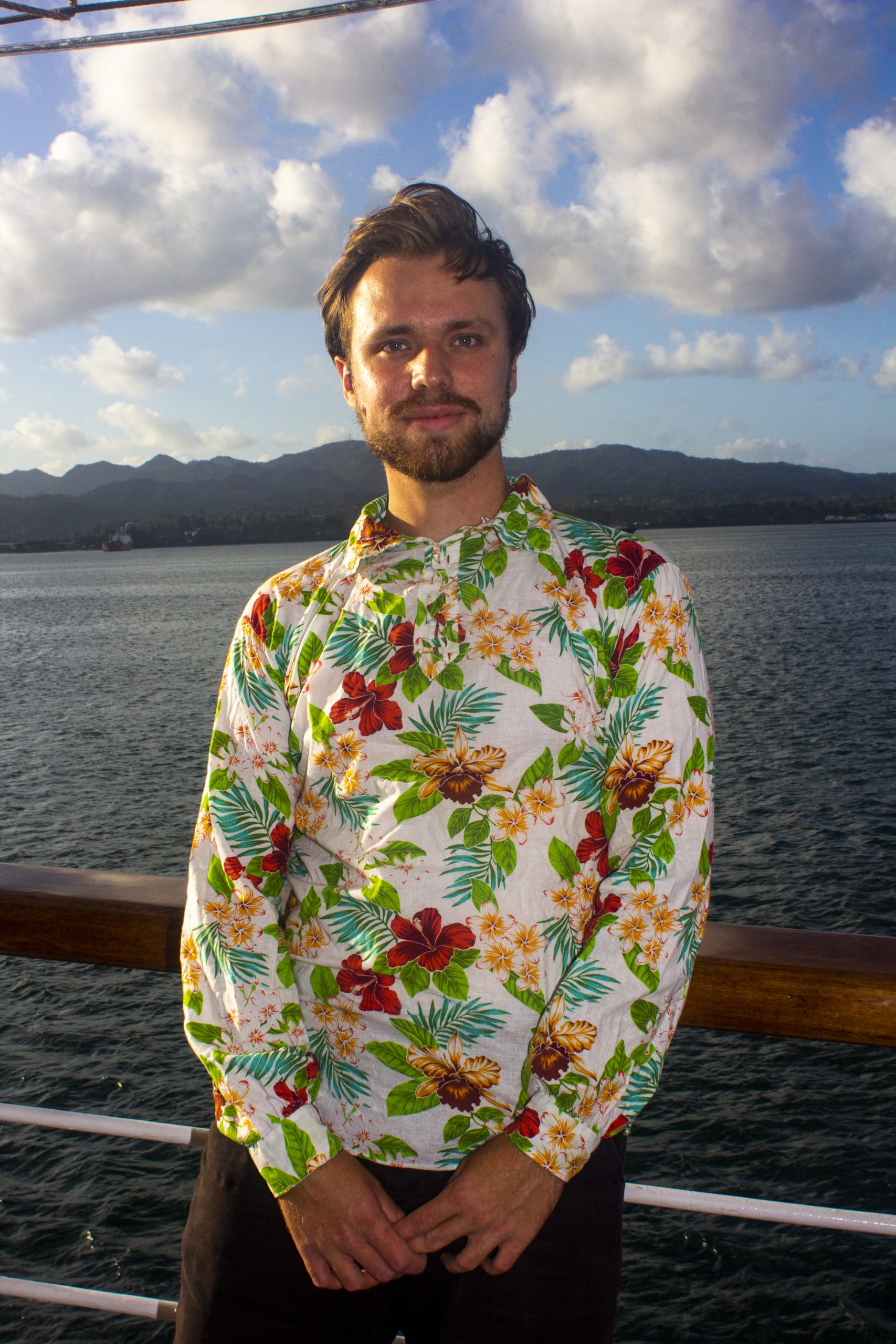
Simon Hole models his Tahitian shirt, handstitched from Tahitian fabric to an 18th century design from the same country, “a culmination of what I have learnt and the thoughts I have had on this voyage.” Photo: Ben Wheeler
Whilst at sea classes consisted of randomly shuffled discussion groups, but the talanoa did not stop there, with learning through anecdotal exchange flourishing across the ship, allowing each student to develop their own ocean narrative as essays or stories in the form of poetry, art, song, dance, even dress.
Many of the students speak of a deep sense of comradery – a bond that forms through discussions such as these, both in and out of the classroom environment, that combines with the efforts of discharging their duties as watch members, despite shifting times and membership due to small, contained COVID and gastroenteritis outbreaks.
This unusual set of circumstances created not disarray and distress, but a temporary harmony and relief from anxiety – often climate linked – for many.
As we return to Viti Levu, linguistics major Andreas Octavio Navarro Nes reflects upon the experience.
“In the past week we have had to cooperate on having a very low water consumption, and also stopping the spread of multiple diseases that were on board.”
“So, it’s kind of a practical experiment in how we solve these issues through cooperation and through our own somewhat self-made rules, without really being forced to, just through all of us wanting to get into a better situation.”
“I think you can make an analogue from that to a lot other social, political and environmental issues.”
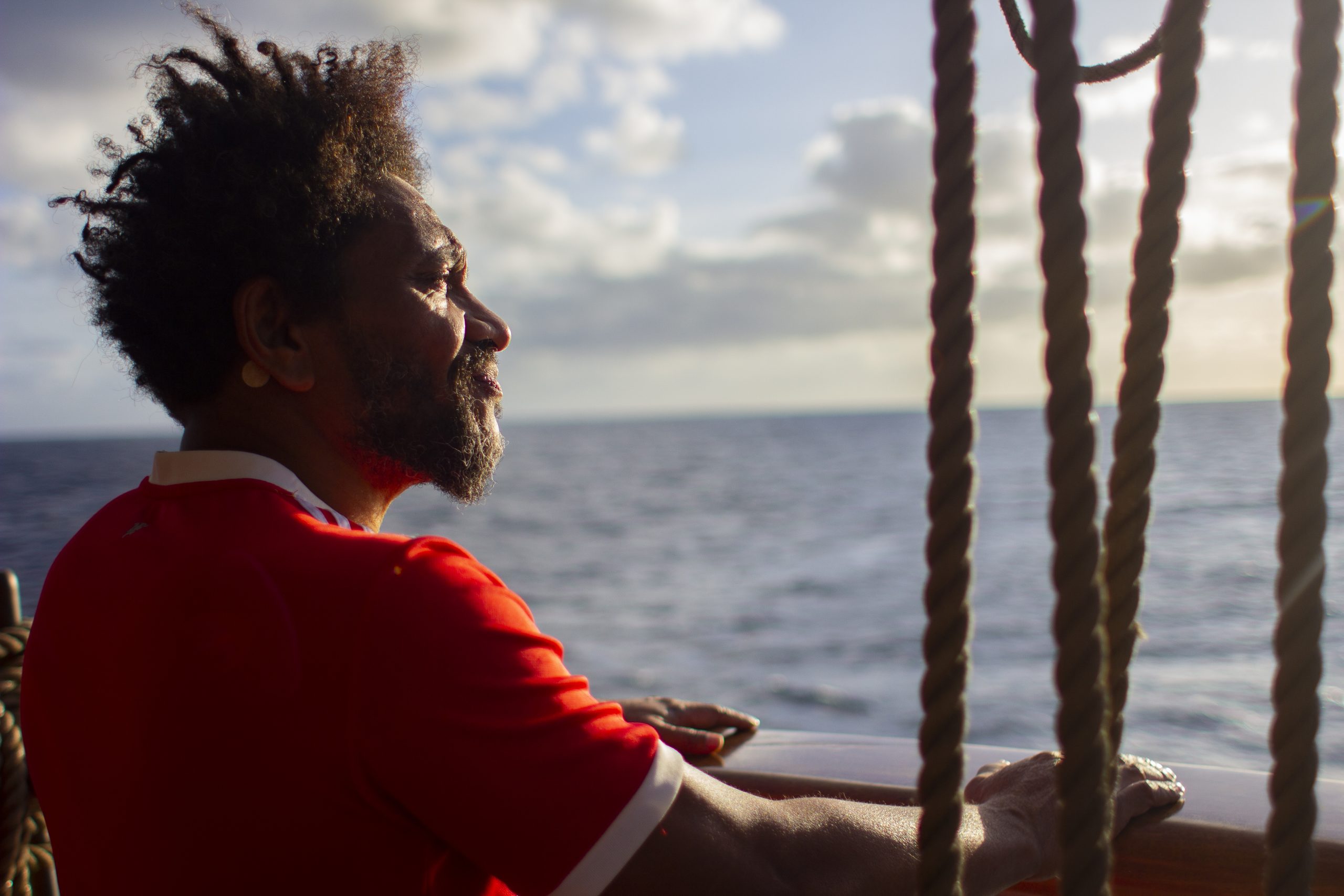
Lensley Livu Bani Kwiri, who is studying for a Masters in Geography takes the Buoy Watch at the ship’s aft as we navigate the Lau Islands. Photo – Ben Wheeler
 Asenaca Blake, enrolled at USP in the Leadership, Governance and Human Rights postgraduate course, is also keenly aware of the experience and its significance as we return to port in Suva.
Asenaca Blake, enrolled at USP in the Leadership, Governance and Human Rights postgraduate course, is also keenly aware of the experience and its significance as we return to port in Suva.
“I was looking for something different,” she muses.
She had already left a position at The Pacific Community to return to her studies and for her, like so many others, this expedition and the chance to learn so much from so many, was just what she was seeking.
“There was a lot of giving and a lot of taking. I think the whole contrast between the two cultures really caused us to think critically about aspects of our culture that we need to improve upon, to build and strengthen; and aspects of our culture that make us proud, and make us who we are. Our conversations have been about our identity – our connectedness to the ocean.”
She pauses, gathering thoughts of stepping onto the Statsraad Lehmkuhl almost three weeks ago, inspired and ready for adventure.
“When I left Suva, I left an old mindset. I felt like the ocean was speaking to me. I felt like the ocean reminded me why my identity is absolutely crucial in discussions like this.”
The day we leave the ship is bittersweet.
Exhausted, but energised, the students who are leaving, and those who are staying and sailing to Palau, embrace and say their goodbyes with tears in their eyes.
It is these tears, and the sweat that has been poured on the decks of the Statsraad Lehmkuhl these last few weeks, that Teresia Teaiwa says connects us to the ocean, “is in our blood.”
For many this expedition, and the memories it will evolve into, mean that connection to the ocean has never been more profoundly felt.
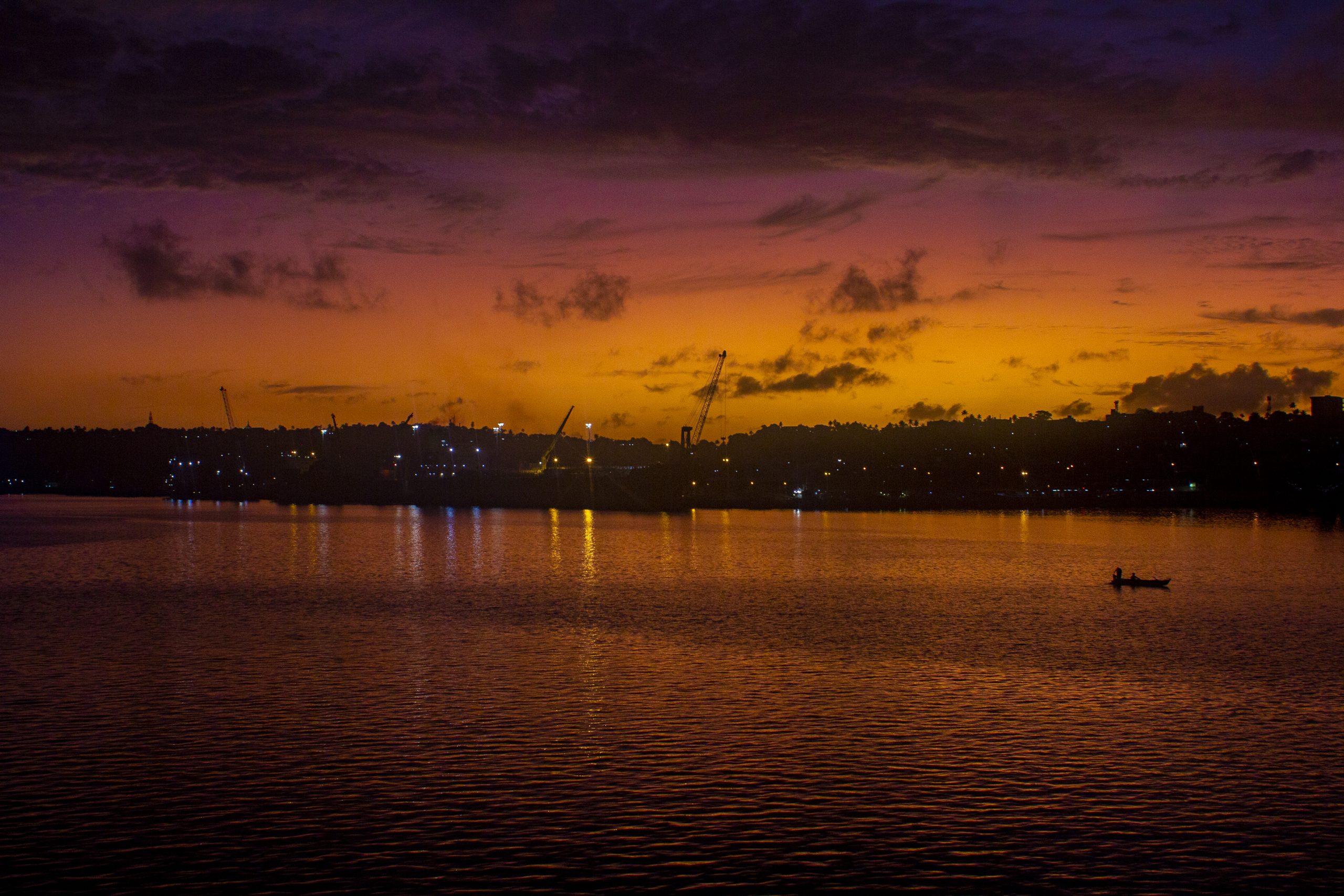
A new day dawns at Suva harbour, silhouetting and juxtaposing the industrial landscape with the fishermen out in their boat on the morning of our disembarkation. Photo: Ben Wheeler

 Benjamin Wheeler spent most of his professional life writing and teaching film and media courses for universities in the UK. In 2019 he moved to Fiji where he has been learning about Pacific cultures and creating blogs and podcasts. In 2022 he directed his first film, The Patience Project, a collaborative short that explores Fijian responses to the COVID pandemic and Suva lockdowns though interviews, music and dance.
Benjamin Wheeler spent most of his professional life writing and teaching film and media courses for universities in the UK. In 2019 he moved to Fiji where he has been learning about Pacific cultures and creating blogs and podcasts. In 2022 he directed his first film, The Patience Project, a collaborative short that explores Fijian responses to the COVID pandemic and Suva lockdowns though interviews, music and dance.
Håkon Larsen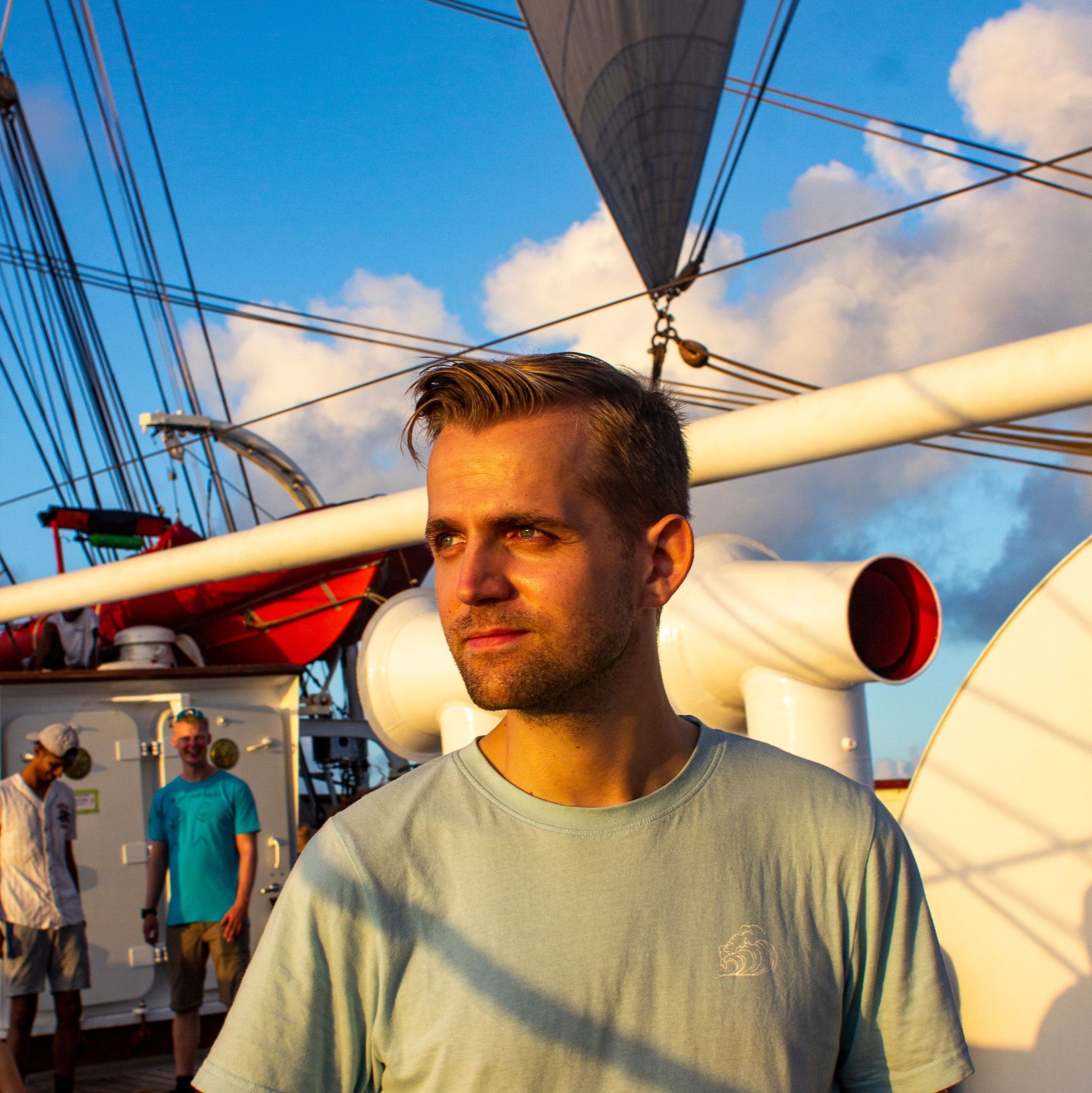 is a social anthropologist who works as a research assistant at the University of Bergen. With fieldwork experience from Fiji, his interest of research has focused on the socioenvironmental aspects of spearfishing, rural development, and the creativity and resilience of subsistence economics in the island group of Lau. He currently works with website and blog management, communication, and administration on the Island Lives, Ocean States project.
is a social anthropologist who works as a research assistant at the University of Bergen. With fieldwork experience from Fiji, his interest of research has focused on the socioenvironmental aspects of spearfishing, rural development, and the creativity and resilience of subsistence economics in the island group of Lau. He currently works with website and blog management, communication, and administration on the Island Lives, Ocean States project.